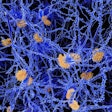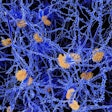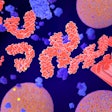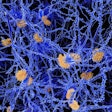
Results from a clinical trial show that a small molecule that binds to kinases involved in inflammatory signaling may induce epigenetic changes in people with mild cognitive impairment (MCI) and probable Alzheimer’s disease.
The researchers recently shared their analysis at the Alzheimer’s Association International Conference. The results came from an exploratory open-label phase II clinical trial that explored the effects of NE3107, an inhibitor of extracellular signal-regulated kinases, on DNA methylation, a type of epigenetic modification. NE3107 is in development at the Nevada-based biotech firm BioVie.
In the study, 23 patients with MCI or mild-to-moderate dementia took the oral drug candidate NE3107 twice a day for three months. Secondary endpoints of the study looked at factors that included skin and blood clocks and gene-specific alterations of DNA methylation.
“We believe the data suggests that NE3107 may have the potential to trigger epigenetic changes that could potentially reduce inflammation and oxidative stress, restore homeostatic regulation, and enable the recovery of gene expression that may then improve neuronal health, and thus potentially improve the clinical measures of MCI and AD,” BioVie CEO Cuong Do said in a statement.
The study linked treatment with NE3107 to a significant reduction in epigenetic age as estimated using a skin and blood clock analysis based on DNA methylation. The epigenetic age of the subjects decreased by 3.3 years from the baseline. Participants experienced significant reductions in several specific measures of DNA methylation, namely DNAmPackYears, DNAmLeptin, and DNAmMonocytes.
BioVie also linked treatment with NE3107 to a 50% or greater reduction in DNA methylation of 400 CpGs, which are functionally important parts of the genome that define and regulate promoter regions. Most (366) of the CpGs had identifiable genes.



















